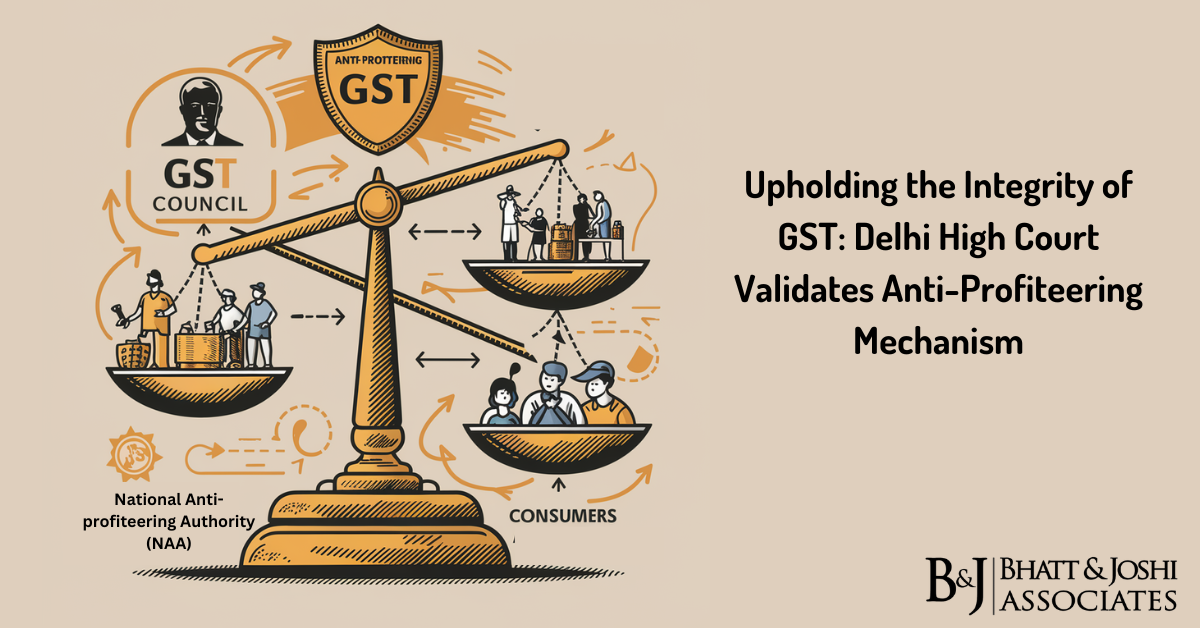Introduction
The anti-profiteering mechanism embedded within the Goods and Services Tax (GST) framework, as delineated by Section 171 of the CGST Act, 2017, serves as a safeguard to ensure that the benefits of tax rate reductions or input tax credits are passed on to consumers. Recently, the Delhi High Court issued a landmark judgment affirming the legality and efficacy of this mechanism, thereby reinforcing the integrity of GST implementation. This article provides a comprehensive analysis of the court’s ruling and its ramifications for businesses operating under the GST regime.
Understanding the Anti-Profiteering Mechanism
The essence of the anti-profiteering mechanism lies in its mandate to prevent businesses from unjustly enriching themselves at the expense of consumers following the implementation of GST. Section 171 of the CGST Act mandates that any reduction in the tax rate or benefit from input tax credit must be passed on to consumers through commensurate reductions in prices. To oversee compliance with this provision, the government established the National Anti-profiteering Authority (NAA), which has now been succeeded by the Competition Commission of India (CCI).
Delhi High Court’s Verdict on the Anti-Profiteering Mechanism
In a significant ruling, the Delhi High Court upheld the constitutional validity of Section 171 of the CGST Act, along with several related rules governing the anti-profiteering mechanism. The court’s decision serves as a resounding endorsement of the legislative intent behind the anti-profiteering provision and affirms its alignment with constitutional principles. The judgment underscores the obligation of businesses to pass on the benefits of GST to consumers and highlights the role of the judiciary in upholding the integrity of GST implementation.
Key Highlights of the Ruling
The Delhi High Court’s verdict in the case of Reckitt Benckiser India Private Limited et al. v. Union of India et al. (2024) reaffirms several crucial aspects of the anti-profiteering mechanism:
- Constitutional Validity: Section 171 of the CGST Act is deemed constitutionally valid, with the court emphasizing that it does not infringe upon fundamental rights or delegate essential legislative functions.
- Purpose and Scope: The anti-profiteering provision is construed as a beneficial measure aimed at ensuring fairness and equity in the transition to the GST regime. It obligates businesses to pass on the benefits of tax reforms to consumers, thereby preventing unjust enrichment.
- Judicial Scrutiny: While upholding the validity of Section 171, the court acknowledges the possibility of arbitrary exercise of power under the anti-profiteering mechanism. It underscores the need for judicial oversight to prevent misuse or erroneous application of this power.
- Industry-specific Considerations: Recognizing the diversity of industries and business dynamics, the court emphasizes the importance of a nuanced approach in anti-profiteering assessments. It cautions against a ‘one-size-fits-all’ mentality and underscores the need for industry-specific analysis.
Implications for Businesses and the GST Framework
The Delhi High Court’s verdict has far-reaching implications for businesses operating under the GST regime:
- Compliance Imperative: Businesses are reminded of their legal obligation to pass on the benefits of GST to consumers and adhere to the anti-profiteering provisions. Non-compliance may result in penalties, including monetary fines and cancellation of registration.
- Judicial Oversight: The court’s ruling underscores the importance of judicial scrutiny in ensuring the fair and equitable application of anti-profiteering measures. It reinforces the role of the judiciary as a safeguard against arbitrary exercise of power.
- Industry Dynamics: Recognizing the complexity of industry-specific considerations, businesses are urged to conduct thorough cost analyses and adopt a tailored approach to anti-profiteering compliance. This entails understanding the unique dynamics of each industry and implementing measures accordingly.
Conclusion: Ensuring Fairness and Equity through the Anti-Profiteering Mechanism
The Delhi High Court’s affirmation of the validity of GST’s anti-profiteering mechanism reaffirms the government’s commitment to ensuring fairness and equity in the taxation system. By upholding the constitutional validity of Section 171 and related rules, the court has bolstered the integrity of GST implementation and underscored the importance of passing on the benefits of tax reforms to consumers. Moving forward, businesses must prioritize compliance with anti-profiteering provisions and embrace industry-specific approaches to ensure transparency and fairness in the GST framework.














